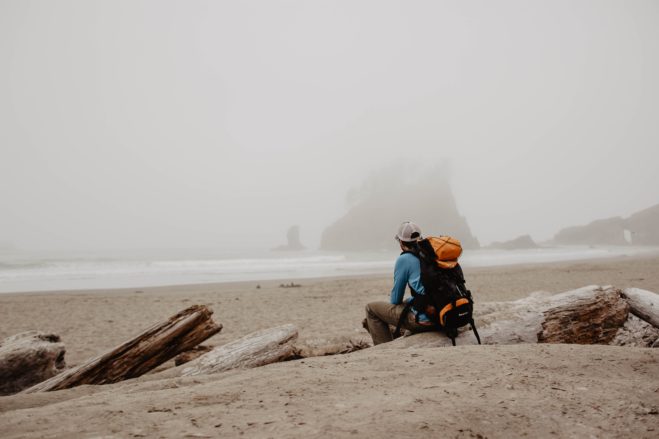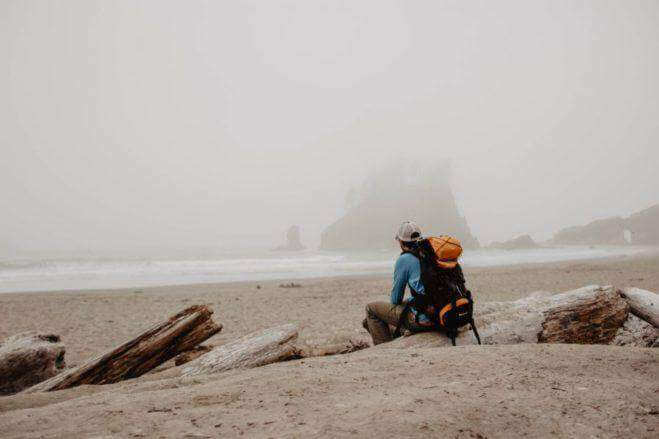
In this episode, we cover Philosophy of the Nomadic Lifestyle 101. Particularly, we examine how this approach to living helps achieve a full-lived reality with meaning.
Topics covered include (a) the disconnection between modern life and living in the now, & (b) the logic of a life of constant change.
Here’s the full pod – enjoy!
Wanna hear more? Subscribe on Stitcher, iTunes, Spotify, or wherever!
And here’s the Cliff’s Notes summary:
Behind the nomadic philosophy lies a logical pattern of reaching higher goals
Because the lifestyle itself is not the goal; what we want are the prizes it affords. Like any other lifestyle or even religion, we have a few rituals that are instrumental to attaining these prizes:
Namely – moving around & constant change. Embracing these “rituals” allows you to disconnect from popular norms and social structures that are popular (Think: 9 to 5, finding a job, getting married, creating assets). Now, that form of life is probably optimal for the vast majority of people – I’m not speaking against it in any way.
There’s a reason why this form of life has become the status quo. And why it has dictated the balance for most of humanity. It works perfectly for most of us. And if that extends to you, there’s no need to rebel against it.
Plus, the reality is that the constant change of a nomadic lifestyle can do more harm than good to some of us. We don’t want to sugarcoat that possibility. A life of never-ending travel may sound glamorous, but there are some very real disadvantages to doing it in the long-term.
That said… For some of us – a small minority – being a bit rebellious can allow us to find something better. Something more fulfilling. But that something isn’t the lifestyle itself; it’s the prizes that this lifestyle guarantees.
And we’ll get to those prizes in a second.
Quick reality check: There is no right way
Unlike many of our other structured articles, we’re about to be all over the place. Because when it comes to the philosophy of the nomadic lifestyle, there is no tried-and-true way to go about it. Brace yourselves.
At the core of all our pondering is the concept of happiness. And the first question to ask about happiness it this:
Is happiness something that we should aspire to?
For us, the answer here is unclear.
You’d think the answer would be a resounding “Yes!” but the truth is that we nomads are often striving for other things that are not necessarily happiness.
For instance, the nomadic lifestyle directly opposes certain happy experiences like the peace and tranquility of just hanging out at home. Our lifestyle isn’t optimizing for that very relatable idea of happiness; it instead optimizes for vitality – a type of experience that requires surprise.
This vitality demands that we leave the happiness of Tranquility. And we substitute it for the benefits of Change.
Quick disclaimer: We’ve heard of a few people who manage to channel the mental vitality of travel while staying in the same place. They have an extraordinary ability to continuously discover something new in the old, in their everyday. It probably requires a lot of imagination, but the theory here is that magic exists everywhere if you’re in the right mindset.
However, most of us can’t just channel vitality everywhere we go. We need to feel surprised or even uncomfortable. We need to surround ourselves with the right stimuli.
The philosophy of the nomadic lifestyle recalls a historical sense of vitality
Now – let’s quickly go back in time to take a look at our tribal ancestors. For them, each day had its own primal dramas and stresses of survival. These daily concerns that defined much of our evolution, however, no longer exist.
Recently, our modern world has introduced levels of certainty and safety that negate that survivalist drama. We went from a world full of moment-to-moment surprises and made it very comfortable, where everything is expected.
In our minds, meals are expected. Shelter is expected. Even our health is expected. We are no longer grateful to survive the day; for us, tomorrow is expected.
And while such comfort and stability have certainly lead to many positives, it’s not entirely clear that they’ve cultivated greater levels of happiness.
Whereas the nomadic lifestyle, on the other hand, has run away from this created order (albeit in a somewhat artificial way). Undertaking the nomadic decision basically means you accept a level of constant change in your life – rather than some of that security that society has worked to build.
You can look at it as a way of shuffling your cards. Instead of taking the modern, popular approach of doing everything you can to optimize your current hand for more Aces and more Kings, you’ve resigned to play the game with whatever hand you’re dealt. Some hands are good… Some less so… And then you reshuffle.
By reshuffling time and time again, you’re pushing yourself away from comfort towards surprise. Which feels a bit illogical at first glance if our goal is happiness, but makes plenty of sense when we look deeper.
Lack of tribalism – A potential flaw of nomadism?
At its base, nomadism is more than a way of life – it’s a manipulation of the self. Because what we’re actually doing is creating an artificial rule of moving between locations to live a fuller life.
But that brings up a weakness of this lifestyle that has to be discussed: Unlike other religions and belief systems based on our important needs of society, this one isn’t based in tribalism. Thus, it is fundamentally somewhat rooted in loneliness. And this is what may prevent it from becoming a mass movement.
No matter what articles you read or which podcasts you listen to, this is one of the main cons listed. Other religions create a critical mass – a sense of “us vs. them” or of togetherness. But this religion does not necessarily establish a mutual enemy or a community. Its charm is much more individual.
Note: As digital nomadism becomes more popular, efforts to foster communities are becoming more rampant. And hopefully, with time, we’ll see togetherness grow and grow. But nonetheless, it’s important to note that the philosophy of the nomadic lifestyle is not as inherently tribal as most others.
The up-side: A nomadic lifestyle can unlock newfound fulfillment
Eli: When I think about my personal lifestyle, it has been nothing short of a miracle. For two reasons:
- It works and keeps sustaining itself.
- It saves me from myself.
First off… It works! And I don’t just mean that it works on a practical or financial level (which it does). I mean that it flows.
What I mean by this: I try to make many decisions on a daily basis (i.e. to exercise, not binge-watch TV, not eat too many sweets) that are critical to my well-being. But these don’t always come naturally; you have to force them. They are difficult and thus, they don’t always flow naturally with my life rhythm.
And recently, we at BecomeNomad have been working on forgiving ourselves for broken promises. Because this is an inevitable inner struggle between what we want to be and what we are. Between what we want to do and what we can do.
But we can’t always be winning: It’s a constant daily struggle.
That said, though, this decision to adopt the nomadic lifestyle just flows. It doesn’t stop happening and doesn’t become a chore. It fully works on a psychological level.
And that’s a big point to consider: Whatever lifestyle you adopt, you want it to be psychologically sustainable. So for this lifestyle, you shouldn’t have to push yourself to change locations and deal with change; it should come naturally. This lesson may be from the philosophy of the nomadic lifestyle, but it really applies beyond that: Your lifestyle should flow with your psyche.
To sum it up: I’m still shocked that this lifestyle that constantly pushes me out of my comfort zone has become so internally sustainable. And… It’s actually become addicting.
Second point – This lifestyle saves me from myself. And what I mean by that is that it helps optimize areas of my life that would otherwise be neglected.
To clarify: Before this decision, life was often boring. That’s the simple truth. I was the kind of person who opted for certainties and kept a low profile. But the interesting thing is… I’m still very much the same boring person! I’m still running away from risk and drama.
However, there’s obviously one small difference. I may still be this relatively boring, risk-averse person, but I am this kind of person while living a nomadic lifestyle. Which itself is not boring by definition – I can’t avoid the new place and interesting situations it constantly puts me.
So the bottom line over here is that this one choice is enough to make my life feel full. I don’t need to overwork myself in other ways; I can still be super careful and not feel like that state of mind is taking away from the depth of my lived experiences.
Seriously – I’ve recently gone from Moscow’s Red Square to the fields of Lithuania to the Caribbean coast of Colombia to the small villages of Thailand. Even if you try to be boring in all those places, you’re likely to fail. It’s hard to be boring when you’re constantly new and constantly discovering.
…Take it as a bit of a life hack.
Final word: Let life naturally take you into the Now
Living in the moment is a hot topic discussion point… And with good reason. Because only the Now truly exists, but most of us have a big problem embracing it.
The idea here is that this lifestyle is going to force you into more moments of Now. You don’t need to become a self-actualized guru to feel this. If you surround yourself with constant change, you’ll come across more and more NOW moments. More moments that capture your present conscience and demand its full attention.
And that’s the beauty of what you can do. Instead of struggling with yourself, instead of wanting to be more interesting or wanting to live “in the Now,” you can pick a lifestyle that naturally generates it.
Doing it naturally is probably better than fighting a constant battle, right? That is at the very core of the philosophy of the nomadic lifestyle.
We know – this blog post kinda went all over the place. But it’s a topic that kinda goes all over the place… And our thoughts on the nomadic lifestyle are changing as constantly as the lifestyle itself.
SO – Tell us! What do you think? Agree or disagree with something? Have an additional point to make or a follow-up question to ask? Let us know in the comments below!



good post